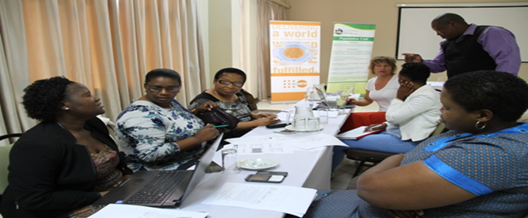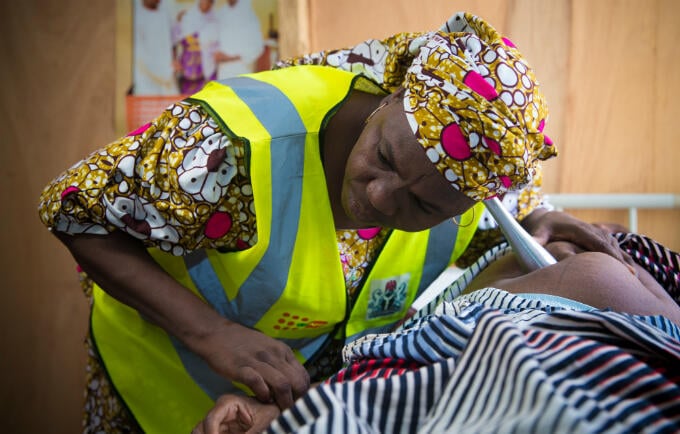Abuja, Nigeria - Zainab Abubakar is a 28 years old mother of six , “I was one month pregnant when I left Gamboru Ingala, I left because of the Boko haram crisis. During my escape, I lost my pregnancy”, she said.
"For women and girls, especially pregnant women, who may face life-threatening childbirth complications, as well as lactating women, caring for newborns throughout the chaos, whether they live or die in a crisis often depends on their access to basic sexual and reproductive health servces" noted Dr. Babatunde Osotimehin, the Executive Director of UNFPA, during his mission to northern Nigeria to advocate for the reproductive health and rights of women and girls.
In Borno, Yobe and Adamawa, the three most affected states by the insurgency crisis, it is estimated that 53 per cent of internally displaced persons are women and girls, of whom about 1.73 million are of childbearing age, with 276, 000 pregnancies expected in 2017. If in Nigeria, about one Nigerian woman dies every 10 minutes from pregnancy related conditions, deaths that could be prevented if women and girls have access to education and reproductive health services, including family planning. The risk of death is heightened in humanitarian crises that displace populations and undermine community social support mechanisms, limiting access to health facilities and workers to take care of the special needs of women and girls.
“For women and girls, especially pregnant women, who may face life-threatening childbirth complications, as well as lactating women, caring for newborns throughout the chaos, whether they live or die in a crisis often depends on their access to basic sexual and reproductive health services”
UNFPA, the United Nations Population Fund, remains committed to the full realization of the sexual and reproductive health and rights of all women and girls in all conditions, crises or otherwise. The Fund has responded relentlessly to the humanitarian situation, in Nigeria’s North East, through its support to 120 health facilities, including clinics in the Internally Displaced Persons’ camp, with supplies of comprehensive reproductive health kits that contain contraceptives for family planning, commodities for pre-natal, safe delivery and post-natal care for pregnant women, treatment of sexually transmitted diseases (STI’s) including the prevention of HIV/AIDS and the clinically management of rape. The Fund has also provided psychosocial support and counseling to those who have been traumatized and survivors of gender based violence. This support is part of a UNFPA plan to restore access to essential sexual and reproductive health services to about 4.5 million people affected by the crisis.
Maryam Yusuf, a single mother and survivor shares her story, “My first pregnancy was at the age of 13, and within 7 years, I had 6 children. With no home or stable job I am afraid of having more children until I am financially ready and my body is strong”, she explains.
The need to access sexual and reproductive health care is a priority for many families, women and adolescent girls, but too often, their needs take a back seat to other urgent needs, like food and shelter.
“We are in a situation here, we are always afraid, running from one place to another. I do not want my wife to be weighed down, so we are accessing family planning services quickly”. Newly married couples, Mr. and Mrs. Baba Tijani, were displaced by the crisis. Without access to reproductive health, Mr. Tijani would constantly be in fear of his wife’s health and survival.
“Our aim is to redouble efforts to ensure that their rights to access health care is protected, the funding gap is bridged and the Government eventually have all the support they need to overcome this challenge” said Dr. Babatunde Osotimehin.

UNFPA goes beyond providing access to reproductive health services to empowering women and girls so they are financially able to support their families and begin the process of living resilient lives. This psychosocial support and empowerment is done through UNFPA safe spaces. Here, women and girls are taught skills such as sewing, soap making, beads making, culinary skills and others. The safe space is often used as an entry point to comprehensive sexuality education and a platform to respond to gender based violence.
Dr. Babatunde Osotimehin, during his mission, also met with the Borno State Governor, Kashim Shettima. The Governor acknowledged the leading role of UNFPA and thanked the fund for its humanitarian support and commitment to protect the rights of women and girls.
The Executive Director also engaged with traditional leaders and institutions, in particular, His Highness Muhammad Sanusi II, the Sarkin Kano, who was honoured as the Grand Patron for Women and Children’s Health. He also met with His Highness Abubakar Ibn Umar Garbai El-Kanemi, the Shehu of Borno, who reiterated his commitment to use his position to protect women and girls from gender-based violence.


